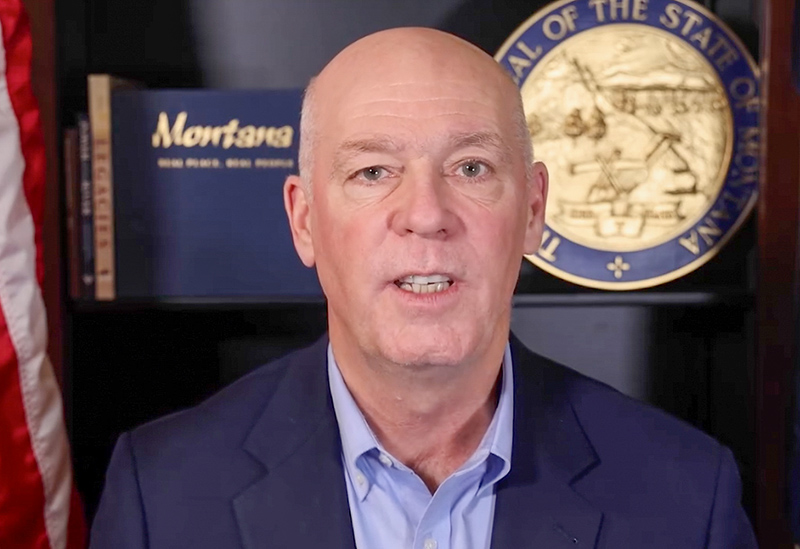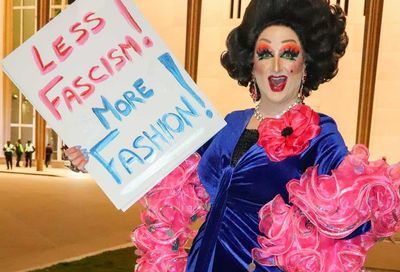NCAA Board of Governors says potential host cities should not have anti-trans laws in place
College sports association received pressure from its own student-athletes, urging it to abide by its own policies.

Late Monday afternoon, the NCAA Board of Governors issued a statement reiterating its commitment to ensuring championship games are held in host cities and states without laws attacking members of the LGBTQ community.
Following a regularly-scheduled meeting last week, the NCAA board confirmed that it “firmly and unequivocally supports the opportunity for transgender student-athletes to compete in college sports,” noting that its current policy — which requires transgender females to have undergone a year of testosterone-suppression treatment in order to compete in sports designated for women — aligns with the policies of the International Olympic Committee, and the U.S. Olympic and Paralympic Committee.
“Inclusion and fairness can coexist for all student-athletes, including transgender athletes, at all levels of sport,” the statement reads. “Our clear expectation as the Association’s top governing body is that all student-athletes will be treated with dignity and respect. We are committed to ensuring that NCAA championships are open for all who earn the right to compete in them.
“When determining where championships are held, NCAA policy directs that only locations where hosts can commit to providing an environment that is safe, healthy and free of discrimination should be selected,” the NCAA continued. “We will continue to closely monitor these situations to determine whether NCAA championships can be conducted in ways that are welcoming and respectful of all participants.”
The LGBTQ media advocacy organization GLAAD praised the NCAA for standing by its policies allowing transgender participation, which, if actually enforced, could strip the opportunity to host championships from various cities or states that pass anti-LGBTQ laws, in particular laws that bar transgender athletes from competing in sports based on their gender identity.
“Every state debating and passing these discriminatory bills is doing untold damage to young people and to the states’ economies and reputations,” GLAAD President and CEO Sarah Kate Ellis said in a statement. “The message is loud and clear: These bans are wrong. Choose inclusion. Everyone wins.”
The NCAA released its statement as legislatures in close to 30 states have introduced legislation to ban transgender participation in sports, with governors in Mississippi, Tennessee, and Arkansas signing such bans into law. South Dakota Gov. Kristi Noem (R) issued two nearly-identical executive orders after vetoing a ban on trans athletes, based on fears that the law’s overly broad restrictions would spark a backlash from the NCAA.
Similar bans are expected to be passed in Alabama, Montana, West Virginia, Oklahoma, and Kansas — although the smaller margin by which the bill has passed the Republican-led legislature in Kansas makes it potentially vulnerable to a veto from Gov. Laura Kelly (D).
See also: Minnesota bill would impose criminal penalties on transgender athletes
Other bills targeting the LGBTQ community that could prompt the NCAA to strip championships from states include measures to deny gender-affirming care to transgender youth (including, in some cases, college-aged youth over age 18), allow health care workers to refuse to provide treatment to patients if doing so would violate their religious beliefs, allow businesses and individuals to turn away LGBTQ individuals and same-sex couples, or restrict what facilities transgender people are allowed to access.
In 2016, the NCAA yanked seven championships from North Carolina following the passage of its so-called “bathroom bill” that barred transgender people from using facilities matching their gender identity in publicly-funded buildings.
“State lawmakers around the country should pay attention: discriminating against transgender students is wrong, against the law, and costly,” Chase Strangio, the deputy director for trans justice at the American Civil Liberties Union, said in a statement. “If you continue to pass these misguided laws state taxpayers risk not only costly litigation but the loss of revenue from these tournaments.”
The NCAA also faced pressure from some of its own athletes, more than 500 of whom signed onto a letter criticizing the NCAA Board of Governors and NCAA President Mark Emmert for remaining silent or issuing tepid statements on the issue of transgender inclusion in sports, urging the collegiate sports organization to relocate events slated to be held in states with anti-LGBTQ laws.

During a recent press conference, current and former NCAA athletes and players, as well as players and coaches from the WNBA, called on the NCAA to abide by its commitment to providing opportunities to all athletes by penalizing states that pass laws targeting transgender individuals, especially student-athletes.
Those calls have been echoed by major women’s sports stars, including Billie Jean King, Megan Rapinoe, Esther Lofgren and Candace Parker, who signed onto an amicus brief in support of a pair of athletes — one transgender, one cisgender — challenging a trans athlete ban that passed in Idaho last year. Additionally, more than 65 corporations that signed onto a letter opposing anti-transgender legislation being pushed in various states.
Athlete Ally, which advocates for LGBTQ inclusion in sports and helped circulate the letter from student-athletes, welcomed the NCAA’s statement, but also called on the NCAA to take “clear and direct action” in response to the anti-transgender athlete bills being promulgated in states, adding “The time has passed to “monitor the situation.”
Similarly, Alana Bojar and Aliya Schenck, two track athletes from Washington University in St. Louis who started the student-athletes’ letter to the NCAA, called the association’s statement a “step in the right direction” but also said that it needs to take a stronger stance on such bills.
“The NCAA holds a tremendous amount of power,” Bojar and Schenck said in a statement. “While their words do carry weight, their actions speak much louder. We will keep pushing until the NCAA takes a strong stance explicitly saying that they will not host championships in states that pass anti-trans legislation. The longer the wait, the more opportunity there is for lawmakers to pass anti-trans bills, endangering the lives of trans people in this country.”
The National Center for Transgender Equality praised the NCAA’s reiteration of its commitment to providing opportunity for trans athletes.
“Every child deserves the love and support of the family and community. Dangerous proposals around the country are putting transgender young people at risk. The harm is real and is felt very personally by transgender kids just trying to live their lives as who they really are,” Rodrigo Heng-Lehtinen, the deputy executive director for the National Center for Transgender Equality, said in a statement. “The NCAA is making it clear that their Board of Governors supports transgender athletes, and the board should hold those states passing these harmful laws accountable.”
Read more:
Missouri man charged with the murder of transgender woman Dominique Lucious
Ex-Manhattan Equinox gym manager sues over alleged sexual harassment
Support Metro Weekly’s Journalism
These are challenging times for news organizations. And yet it’s crucial we stay active and provide vital resources and information to both our local readers and the world. So won’t you please take a moment and consider supporting Metro Weekly with a membership? For as little as $5 a month, you can help ensure Metro Weekly magazine and MetroWeekly.com remain free, viable resources as we provide the best, most diverse, culturally-resonant LGBTQ coverage in both the D.C. region and around the world. Memberships come with exclusive perks and discounts, your own personal digital delivery of each week’s magazine (and an archive), access to our Member's Lounge when it launches this fall, and exclusive members-only items like Metro Weekly Membership Mugs and Tote Bags! Check out all our membership levels here and please join us today!


























You must be logged in to post a comment.